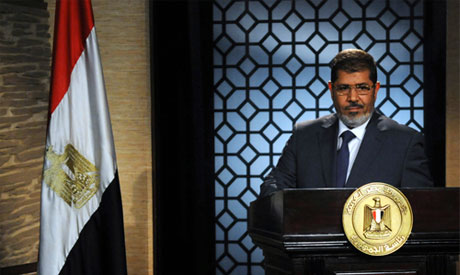 The major challenge facing Egypt's president-elect Mohamed Morsi will be how to redress the downward spiral of the country's battered economy which relies heavily on tourism, analysts say.
The major challenge facing Egypt's president-elect Mohamed Morsi will be how to redress the downward spiral of the country's battered economy which relies heavily on tourism, analysts say.
The candidate of the once-banned Muslim Brotherhood was confirmed Sunday as Egypt's first democratically elected civilian president, 18 months after street protests forced veteran leader Hosni Mubarak to quit.
Since then he has been working to select a government, with an aide saying Morsi was holding talks to appoint an "independent national figure" as his premier. "Most of the cabinet will be technocrats," he added.
The 60-year-old US-educated engineer has already pledged to improve security in Egypt which was hit by political upheaval following Mubarak's ouster, and redress the economy which also took a heavy beating.
But analysts say the Islamist leader will face an uphill battle, citing a lack of investor confidence in Egypt where the economy has shrunk, tourist revenues have plunged and the deficit soared.
"The Islamists don't have a clear and detailed programme so far," said Mona Ismail, former head of the Arab Investment Bank.
"The only way for Morsi to face up to the challenge is to seek help and surround himself with experts, outside of the Brotherhood," she added.
Ismail acknowledged that many prominent businessmen have risen from the ranks of the Brotherhood, but insisted that the mammoth task of redressing the economy of the Arab world's most populous nation requires expertise.
"The biggest challenge will be to attract foreign investment and (revive) the economy," she added.
Morsi, who graduated with an engineering degree from Cairo University in 1975 and received a PhD from the University of Southern California, resigned from the Brotherhood to take the top post.
During his campaign, he echoed the determination of the Brotherhood to uphold a market economy for Egypt, as well as develop social assistance, without spelling out his strategy.
Two days after his confirmation as president-elect, the International Monetary Fund said it is ready to help Egypt with its "significant immediate economic challenges."
A spokesman for the global crisis lender pointed specifically to the need in Egypt to "restart growth and address the fiscal and external imbalances."
Since late last year the IMF has been discussing with the country's interim leadership a possible $3.2 billion loan to help Cairo bridge fiscal shortfalls while restructuring the economy and financial system.
Morsi must also find ways to revive tourism, one of the main sources of revenue and job provider for 10 per cent of the population, which was badly hit during and after the uprising that ousted Mubarak in February 2011.
Concerns for the future of the lucrative sector have mounted amid fears that Islamists, who won a crushing victory in now overturned parliamentary elections, might impose strict Islamic law that could scare off Western holidaymakers.
Meanwhile central bank reserves plunged from 36 billion dollars at the start of January 2011 to 15 billion dollars now, threatening to curtail Egypt's ability to import basic goods such as wheat and refined oil products.
The budget deficit has deepened and could reach 38 billion dollars for the June 2012-June 2013 fiscal year, compared to 24 billion dollars the previous year, according to official estimates.
After growth of 5.1 percent in 2010, Egypt's GDP grew just 1.8 percent in 2011.
A day after Morsi's confirmation as president-elect there was also good and bad news.
On the positive side the Cairo bourse closed on Monday on an upward surge of 7.5 percent, its highest since the uprising.
But Standard and Poor's said it was placing its 'B' long-term foreign- and local-currency sovereign ratings on Egypt on CreditWatch with negative implications.
"The CreditWatch placement reflects our view that we may lower the long-term ratings over the next three months if, among other factors, we think Egypt's main political factions are unwilling or unable to compromise sufficiently on political decisions that would reduce pressures on fiscal and external indicators," the ratings agency said.



